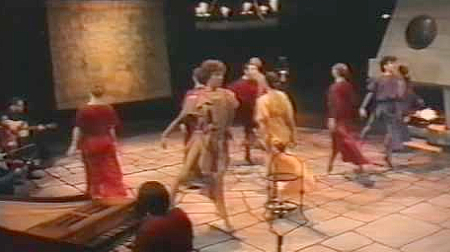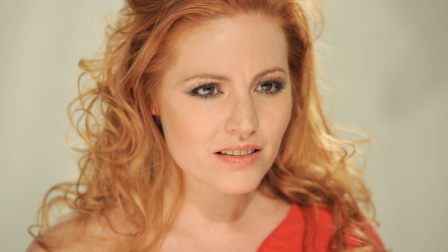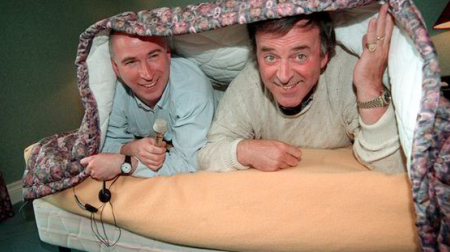It’s time for the biggest annual sporting event on the planet. Yes, Super Bowl 48 is upon us, as the Seahawks (15-3) take on the Broncos (also 15-3 on the year) for the Vince Lombardi trophy. Given the Eurovision Song Contest can easily be called ‘The Super Bowl Of Song’, what can our favourite three-minute lyrical challenge learn from the game that loves the two-minute warning?
We’ve already discussed why the Eurovision Song Contest (born 1956), and the National Football League’s Super Bowl (born 1967) are practically the same show (and if you’ve forgotten, here’s Sam’s take on the whole ten yards), but Eurovision should sit down this Sunday and take some notes to present to the Reference Group.
Tonight’s Broadcast Is Brought To You By Karl Cassel’s Ear Defenders
How about the Eurovision interval act? There’s naturally a direct correlation to the Pepsi Halftime show. This year it features the delights of Bruno Mars and the Red Hot Chili Peppers. But to take it from the Halftime show to the Pepsi Halftime Show cost the Pepsi team seven million dollars.
You can take all the broadcaster’s delegation fees to enter Eurovision, add them up, and you still wouldn’t be close to Pepsi’s payment to the NFL. With all the talk of reducing the costs to the delegations, there would be a lot of interested parties if the EBU could charge a nominal single Euro thanks to a solid subsidising advertiser.
Advertising and sponsorship is probably the area where the NFL have field advantage. America is a single advertising ‘territory’ for a company, whereas going pan-Europe means a lot of liaising with the various national branches of any company. But there is no question that the opportunity is there.
There are potential drawbacks, of course, to major corporate sponsorship, even if you find a company universal enough to be present in every broadcasting nation (or happy enough to advertise in Montenegro even if they have no corporate presence). While the revenue from commercial tie-ins could be massive, so is a potential lack of subtlety.

Let’s play spot the Jedward brands…
Just imagine this hypothetical postcard: everybody’s favorite Irish twins traipsing about their neighborhood, wearing shiny new Nikes, gleefully wreaking Jedwardian havoc as they bounce past a McDonald’s. As the postcard’s thirty seconds comes to a close and the boys watch the sun set, taking selfies on their iPhones, John passes Edward a Pepsi and a bag of Haribo, and they wave for the camera. People often tune in to the Super Bowl specifically for the commercials, but Eurovision would need to walk a fine line between sponsorship and the inundation of ads that is so common on television in the United States.
On the flip side, the Eurovision advertising is wonderfully subtle at the moment. Can you recall who the major 2013 sponsors were without looking? Could someone watching the show at home remember one hour later?
Doesn’t This Remind You Of Timedance From 1981?
Speaking of interval acts, they can be rather forgettable at the Eurovision Song Contest. Yes, we super-fans all have our favorites, and many of us can still do the choreography from “Glow”, but if I ask you to think about the Interval acts over the last ten years, how many would the average Eurovision viewer remember? I don’t mean the hardcore fans, I mean the people who tune in every May, but have no idea what ‘A Dal‘ is. Can they recall what floated over the audience in Moscow? Were ‘The Fire of Anatolia’ any good? Or what about that time when thrash metal mashed into a symphony?

Who thinks “All this needs is a dash of Michael Flatley”?
Perhaps the only universal touchstone of the interval acts that has extended to the masses has been Riverdance, but one moment out of close to sixty years is not enough. But ask people if they remember Madonna at the Halftime Show and they are there. Or The Rolling Stones, Prince, Janet Jackson’s shielded nipple (and the inexplicable frenzy that followed it), Paul McCartney, Destiny’s Child…and that knee slide into a crotch cam.
The Song Contest needs to be making more memorable moments than it is. Riverdance was 1994, we can’t keep trotting out a twenty year old example as an ‘ongoing success’.
Valentina Monetta is a Viking.
Let me explain. Monetta is now arguably the most well-known ‘never qualified’ singer at the Contest, a position that may very well be magnified on May 6th. As optimistic as many fans are, it’s quite possible that we’re looking at her going zero from three. American Football has their bogeys as well, with the Minnesota Vikings and Buffalo Bills each making four Super Bowl appearances for…no victories. By comparison, the New York Jets play the role of Austria, having clinched their lone championship back in the 1960s.
Go through any American sport and you find these heartwarming, heart-wrenching underdog stories. To be quite honest, it feels like most of NBC’s Olympic coverage is based on this theme.

Is it Nancy, or is it Tonya? There’s only one way to find out…
And Eurovision? Each Song Contest is treated as a standalone event. Apart from occurrences by performers such as Monetta, Logan, Joksimovic, and Bilan, it is rare for the ongoing background stories of Eurovision to be used to create continuing story lines and emotions by the EBU or the production team. If you get a “Welcome to Eurovision, which has a rich history” in the opening, you’re lucky.
Yes, each year the host broadcaster changes, but we retain the same general format and basic shape of the show. Why can’t we retain, for want of a better phrase, the plot lines from previous years? Is the argument that we are supporting individual singers who start from a blank canvas? If that’s the case then why is the scoreboard, the voting, and the branding of each act, all built around the country?
Everyone knows San Marino hasn’t qualified, everyone knows Ireland won it seven times, everyone knows that there are countries which really should dress in a black cape, wear a pencil moustache, and have a Dick Dastardly cackle. More should be made of the history of the Contest during the Contest.
The Singing Starts On Sunday
If there’s one thing that everyone in America knows, it’s when the Super Bowl is. It’s impossible to miss in the schedule, it’s referenced in talk shows, news bulletins, breakfast TV, and in the aisles of every supermarket. Leading sitcoms will craft episodes around the event while they mirror society. It’s not just a one hour game played over three hours, it’s more than two weeks of build-up across every media organisation.
While the hardcore Eurovision fan might dream of that sort of coverage of the Contest, it’s not something that the broadcasting partners can switch on overnight, they each have to make their own decisions on coverage, there is no single broadcast network over the continent (if you think about it, one of the few times the continent does come together is during the Song Contest), but more regional build-up and sharing of content would be welcome.
There are some countries that get it right (hello, Australia and SBS!) but if broadcasters want to get more of a return from their Eurovision adventures, part of the answer might be to leverage the build-up to the Song Contest in the same way as a large-scale sports event. If they need some ideas, the Eurovision Fan Community ramps up the content four weeks out; I’m sure we can come up with some ideas for them.
Regular Seasons Coverage Across The Borders
When Festivali i Këngës and Melodifestivalen top the Twitter Trending Topics in the United Kingdom, you know that the National Final season is breaking out internationally. Through streaming technology – be it the EBU’s Octoshape P2P system that powers Eurovision.tv/esctv, or national broadcasters dropping the geo-blocking so anyone can watch a live stream of their Song for Europe shows – the Song Contest’s ‘regular season’ is now appointment television for many people around the world.
But it’s still locked on the internet.
Previously, the EBU offered the preview videos and a preview show to broadcast partners. With the rise of YouTube, this is now an optional choice, with many partners allowing the internet to fulfil the needs of the previews, but here’s an opportunity.

Inserted without comment.
Just as sports fans are used to a ‘highlights’ recap program (think ‘Match of the Day’ here in the United Kingdom), would ‘Monday Night Concert’ work? A highlights show running through January to March, rounding up the National Final action from the previous seven days with official music videos, winning performances, and studio punditry?
It might be a tough gig for the EBU if they want to retain as much impartiality as possible, but loosening up that requirement by a few percentage points would allow for an exciting show that could be provides to broadcast partners as part of their delegation fee, increasing the value of entering the Contest.
Four of America’s Most Lyrical Sportswriters
The sharp-eyed YouTube watchers among us will have spotted that last year the EBU ran a series of live interviews with the artists and a number of guest interviewers on Google Talk (a roster that included some of the ESC Insight team). As with most pilots, there are areas to improve, but connecting fans, the performers, the press, and creating buzz in the run-up to the Contest is to be applauded. It would be great if everyone could be more involved in endeavours like this, and if all else fails, perhaps the EBU can grab some copies of ‘Around the Horn‘ for inspiration?
And Now Over To The Fan Zone?
What lessons can the Eurovision Song Contest learn from other sporting and entertainment events? How can these additions create more value for everyone involved in the Song Contest? Who needs to take charge and make ideas like this happen? Should the EBU offer this and more, and let the broadcasters decide what extras to take? Let us know your thoughts in the comments.









Didn’t we have this last year?
And we talk about ‘who wins ESC’ every year as well! Seriously though, last year was ‘why they are broadly the same’ (and it’s the first link in the article). This year was ‘what can the EBU learn from the NFL’. Struggling to think of next year’s topic…